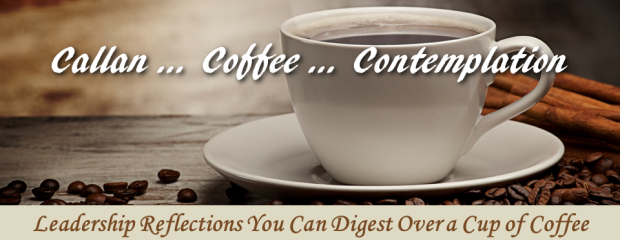Callan…Coffee…Contemplation for the Week of May 12th
Symbols and Stories
I just reviewed the top blog posts on several leadership sites because I wanted to see how many articles focused on reducing their leadership topics to a checklist or menu. You know the type, they are usually titled “The six steps for….,” or “The five characteristics of…,” or, “The 8 essential truths of such and such.” Here’s the problem with this checklist-style format: It creates a false paradigm that leadership is a tactic and can be reduced to basic checklists, menus, and to-do lists. This leads us away from the greater truth about leadership, and leaders, which is this: Leadership is a master craft, and leaders master craftsman, and therefore great leadership is a lifelong journey based mainly on gaining self mastery. Instead of reducing leadership to self-help jargon, we’re infinitely better conceiving of leadership, and teaching it, through forms like symbols, stories, legends, metaphor, myth, and parables. Why? Because these forms convey much deeper and timeless truths and, more importantly, these forms force the aspiring leader to wrestle with these truths, solve the mysteries anew, and appropriate the truth for themselves.
Reduced and Disconnected
In our modern world, a harsh reality leaders will have to increasingly deal is a growing sense of disconnection, diminishment, and reductionism in our society. As our society becomes more segmented and dispersed through technology, leaders may find their followers at a loss for trustworthy and timeless absolutes. It is as if we have slowly lost healthy criteria to anchor us and cohere to, such as norms, boundaries, and archetypes. When we lose these absolutes, we become adrift, unconfident, and trapped in small, private worlds dominated by personal voices and personal choices. Everything becomes relative. Not the stuff of greatness! Every generation can be caught in its own limiting quicksand. It has been heroic leaders throughout history who have broken this trap by reconstructing the climate in which people live and work. Today, the surest way for leaders to move out of a reduced and disconnected paradigm and into a more elevated and expansive one is to care about, and teach, greater stories, larger histories, soaring virtues, and wiser thinkers.
A Quest
I am convinced the study of leadership is best approached not from seeking easy answers, but from asking the hard questions. Here’s why. When we focus on getting easy answers, what we mostly end up with is a thin gruel of checklists, menus, formulas, and gimmicks which, though admittedly neat and tidy, tend to generate mediocrity. This focus on easy answers and self-help leadership results in a cottage industry of lots of people with lots of thin answers. Doubt this is true? Walk through a bookstore and peruse the Business Section, paying close attention to the titles and subtitles of the offerings. So, what is a wiser approach? To be on a quest; a purposeful, mindful, and intentional path of inquiry that looks first for the hard, vexing questions about leadership and followership. We have to learn to live for a time without all the easy answers, and work through the discomfort of searching but not yet knowing. Isn’t it interesting that the words quest and question share the same root?
Being Conscientious
Truly excellent leadership requires the admixture of two different, yet equally crucial, abilities: one, the ability to think in terms of system-level and strategic context; and two, the ability to focus and execute with laser-like intentionality. Today, I am reflecting on the latter; the ability to execute. So, what quality allows great leaders to remain mindful, intentional, and purposeful, even amidst the maelstrom of change, and execute their plans? I believe the answer is conscientiousness! Great leaders cultivate within themselves deep self mastery, self discipline, and personal resolve. To be conscientious requires deep habituation—an almost DNA-level mastery—which ingrains deep within one’s character qualities like organization, self regulation, self control, determination, punctuality, and resilience. We each may be born with different amounts of conscientiousness, but regardless of what we are born with, we can, and must, cultivate more, if we want to be truly great and impactful leaders.
Experience
I often state this observation publically when I teach: I have mastered nothing as a leader as a result of studying a list, menu, recipe, or formula. Yes, these lists are tidy and fine things in themselves, but I cannot truthfully say any of them ever fully educated me as a leader. Why? Because lists and menus cannot convert us; only experience can. And it is only through the cauldron of experience that we can unlock the mysteries of leadership, own the knowledge, and gain self mastery. Even when I think of this topic in a historical context, I cannot think of a single great leader, someone truly significant, who came to greatness by simply studying a list of “to do’s” or following a prescribed menu of attributes. Until we are forced to navigate the actual rocks and hard places of leadership experience, we remain outside true transformation. Great leadership cannot be gained simply as an intellectual exercise; it must be gained by going into the desert of experience and emerging, transformed.
Check back next Monday for a round up of this week’s social media shares. Or check us out on Facebook, Twitter, Google+, or Pinterest to see our posts every day!
Tweet Share






